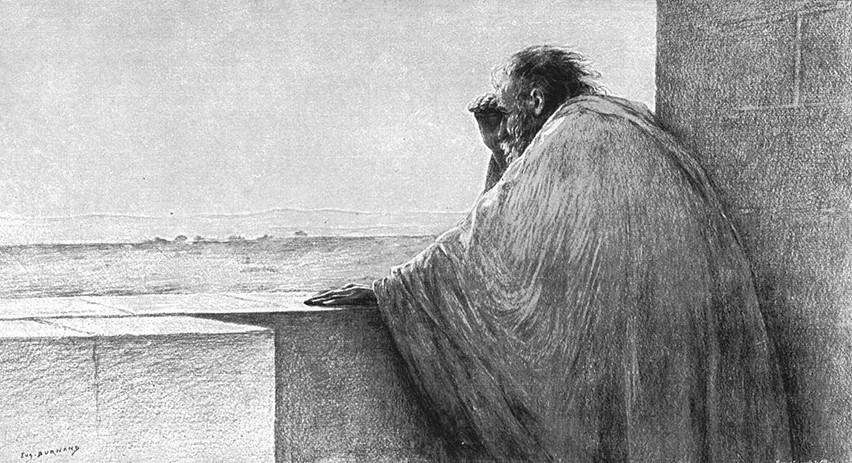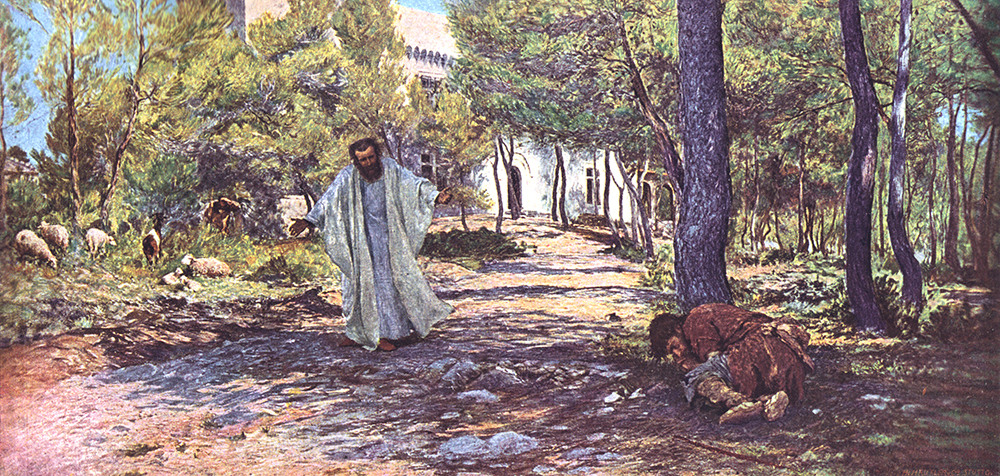When Judas Could be Found

The description of the father in the parable of the Prodigal Son is both a very touching and encouraging one (cf. Lk. 15:11-32).
The fact that we find him waiting for his lost son’s return is not some extraneous detail. The man was keeping constant vigil, keeping his eyes and heart focused on the one and only road that led back to his own house: the road of repentance.
And as our Lord describes, no sooner had he caught glimpse of the boy still a long way off, the father could wait no longer for his son to reach him; he anxiously runs out to get him. Knowing his son’s heart, the father ignores the apology that had been compulsively rehearsed since “coming to himself,” and a grand celebration ensues, for indeed there is much joy in heaven upon one sinner that does penance (Lk. 15:7).

But since no one knows the Father except the Son (Mt. 11:27), these revelations about the very character of our heavenly Father apply equally to our Lord, for there can be no division among the three Divine Persons. This long-suffering vigil on behalf of sinful men, waiting for their return upon the road of repentance, threads its way through the entire life of our Savior, culminating with Christ’s cry of I thirst from the Cross, verifying the tremendous lengths God will go through in His search for souls He created. While we are only given so much time, as long as we have it, we can take solace in the fact that Someone is watching and stands ready to receive us at any moment.
This reality – clearly divine in its formulation – is lived out in our Lord’s treatment of Judas.
Even a momentary reflection of what Christ had to endure from this Apostle should give us pause as we ponder what we sometimes must endure from our neighbors. Normal human sentiment usually wishes to reduce in our lives the presence of those whom we find disagreeable; how much more so when someone is known to be our enemy.
While we find Christ doing the same out of prudence at times, like with the Pharisees, it never seems to be the case when it comes to Judas.

Perhaps we all have some feel for Judas’ shoes. Uncomfortably so, as we are quite aware of the rebellion within that threatens I will not serve. While nothing escapes our Lord’s attention about how we truly are, this never stops Him from receiving us. Christ sees how and where our hearts may betray our words, and it bothers us that we cannot hide such sentiments from Him. He knows when we perhaps have had to force ourselves to our knees and would rather be watching a movie.
He sees where our faith may have been severely challenged by something and now find ourselves holding out on Him, the piety of our youth proving itself to be a weak and shaky foundation, all the solid reasons for believing suddenly becoming like straw, giving way to a bewilderment of what our Faith really means, perhaps setting ourselves on a destructive path of poor decisions and coping mechanisms.
There may be even anger directed towards Him (albeit misplaced in hindsight), but that is too dangerous to bring up and ask for light on, and so we pretend it is not there while we talk about superficial things. We maintain a bad friendship with another, or persist in some unmortified passion, while we thumb our Rosary beads, hoping He is not going to call us out on it.
It can be lots of different things where we sense our personal betrayals. But like with Judas, our Lord may not call it out for a time, even a long time, enduring it all the while, waiting for us to respond to the grace He sends to come to terms with it – to “come to ourselves” like the prodigal – and then make the necessary change in partnership with Him.
That is really important to remember: when we “come to ourselves,” our Lord does not wish that we scurry off somewhere and return to Him when we perceive the problem is fixed. Such would be impossible. He stands most willing and ready to walk with us through it all, with all the bumps and bruises that will come, because without Him we can do nothing (Jn. 15:5).
Recall then that Judas lived almost two full years in the intimacy of the Apostolic college. He was a chosen Apostle: You have not chosen Me, but I have chosen you (Jn. 15:16). While it can be inferred that his motives for following Christ were not the highest, seasoned with a fair measure of ambition, similar claims can be made of the other Apostles. After all, they were intent on Christ establishing an earthly kingdom and giving them reign over the twelve tribes of Israel. How often are they found arguing about who was the greatest among them, even at the Last Supper, completely unaware of what was about to happen!

The key difference between Judas and the other eleven was that malice would begin to take hold of his heart; so instead of simply resigning his post when things got too much for him, content to think our Lord and his band as fools and happy to be finally finished with them, Judas instead became intent to destroy Christ – and turn a profit on it to boot. But it did not start out that way for Judas, as our Savior would never have picked an already-sworn enemy as one of His Apostles.
While Judas is labeled as “the betrayer” almost every time his name is mentioned, because that tragically became his defining moment, he was not thinking about betrayal from the instant he became an Apostle.
 There was good in Judas, good that our Lord continued to hold on to while trying to get Judas to confront the bad. Could not the same be said for any of us? But on account of Judas’ particular internal struggle, special attention would be required, and so our Lord would embark on the most crucifying of vigils on Judas’ behalf.
There was good in Judas, good that our Lord continued to hold on to while trying to get Judas to confront the bad. Could not the same be said for any of us? But on account of Judas’ particular internal struggle, special attention would be required, and so our Lord would embark on the most crucifying of vigils on Judas’ behalf.
None of the Apostles knew; they were equally suspicious of themselves when Christ stated that He would be betrayed by one of them (cf. Mt. 26.21). Everything the Evangelists express about Judas as a thief and traitor is after the fact.
Christ was not going to change His mind about Judas, any more than He changes His mind about the creation of any soul. Not once is regret expressed about His choice; never is a threat voiced about expulsion.
As the chasm between Judas and Him widened, our Lord relieves His concerns on no one. And the one time Christ does express sorrow, it is about the consequence of such an evil act, not about who was the perpetrator: It were better for him if that man had not been born (Mk. 14:21). Until then, His warning hints to Judas are private and personal, an inside conversation almost. Perhaps the most prayers were offered for Judas than any of the other Apostles, as parents tend to do for their most wayward child.
 Christ maintained His silent vigil for Judas to come to himself through it all, giving Judas equal treatment and access to Himself as the others.
Christ maintained His silent vigil for Judas to come to himself through it all, giving Judas equal treatment and access to Himself as the others.
Even after Judas had decided on treachery, Christ would ordain Judas a bishop, give him Holy Communion, wash his feet, and grant him leave to depart the Supper without any of the Apostles knowing what was transpiring. Our Savior then delivers His entire priestly discourse to His Apostles – words of the profoundest love that have ever emanated from His Sacred Heart – amidst the gathering storm front of betrayal from one of His own. And when Judas finally encounters Christ with his entourage of bandits outside Gethsemane, coming up a road that could have easily been for the return of the prodigal, our Savior also goes out to meet him and calls Judas Friend, a title of familiarity and affection that provided Judas with an out, if he would just take it.
Indeed Judas does “come to himself” in the wake of the betrayal, but tragically repents unto himself. He runs and hides, unable to travel the one road that led to Calvary, where Christ still continued His vigil, ready to forgive.
 Perhaps when Christ left the gates of Jerusalem carrying His Cross, He caught sight of the far-off silhouette of Judas slowly twisting in the wind. That is the last time Christ found Judas – but was left with nothing to do.
Perhaps when Christ left the gates of Jerusalem carrying His Cross, He caught sight of the far-off silhouette of Judas slowly twisting in the wind. That is the last time Christ found Judas – but was left with nothing to do.
And it never had to be that way.
Our Lord’s treatment of Judas should give us hope of how He will go through the same lengths for any soul. Although we can and do betray Christ by our sins and failings, it does not mean we will persist in them. His grace is all-powerful when we cooperate.
Christ wanted Judas in heaven just as much as He wants any of us. But unlike Judas who hid himself more and more even while in Christ’s presence, forging his final betrayal, it means having the humility to “come to ourselves” daily and be found by Someone with eyes constantly focused on us in a loving and divine vigil, and ready to meet us at every step.
March 5, 2021








